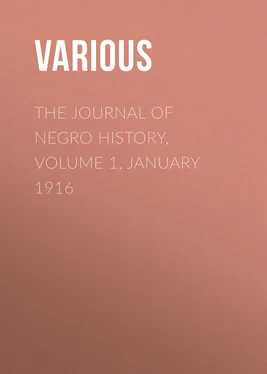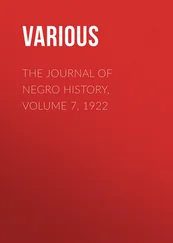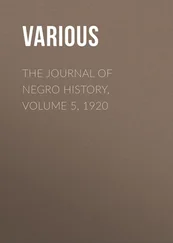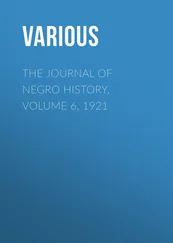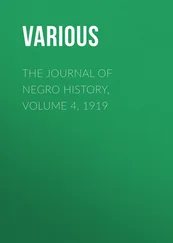Various - The Journal of Negro History, Volume 1, January 1916
Здесь есть возможность читать онлайн «Various - The Journal of Negro History, Volume 1, January 1916» — ознакомительный отрывок электронной книги совершенно бесплатно, а после прочтения отрывка купить полную версию. В некоторых случаях можно слушать аудио, скачать через торрент в формате fb2 и присутствует краткое содержание. Жанр: foreign_antique, periodic, История, foreign_edu, на английском языке. Описание произведения, (предисловие) а так же отзывы посетителей доступны на портале библиотеки ЛибКат.
- Название:The Journal of Negro History, Volume 1, January 1916
- Автор:
- Жанр:
- Год:неизвестен
- ISBN:нет данных
- Рейтинг книги:5 / 5. Голосов: 1
-
Избранное:Добавить в избранное
- Отзывы:
-
Ваша оценка:
- 100
- 1
- 2
- 3
- 4
- 5
The Journal of Negro History, Volume 1, January 1916: краткое содержание, описание и аннотация
Предлагаем к чтению аннотацию, описание, краткое содержание или предисловие (зависит от того, что написал сам автор книги «The Journal of Negro History, Volume 1, January 1916»). Если вы не нашли необходимую информацию о книге — напишите в комментариях, мы постараемся отыскать её.
The Journal of Negro History, Volume 1, January 1916 — читать онлайн ознакомительный отрывок
Ниже представлен текст книги, разбитый по страницам. Система сохранения места последней прочитанной страницы, позволяет с удобством читать онлайн бесплатно книгу «The Journal of Negro History, Volume 1, January 1916», без необходимости каждый раз заново искать на чём Вы остановились. Поставьте закладку, и сможете в любой момент перейти на страницу, на которой закончили чтение.
Интервал:
Закладка:
These physicians maintain a national medical association which meets annually in different parts of the country and prepare and discuss papers bearing upon the various phases of their profession. There are under the control of Negro physicians a number of hospitals where are performed operations verging upon the limits of surgical skill. The profession has developed not a few physicians and surgeons whose ability has won recognition throughout their profession. A number of them have performed operations which have attracted wide attention and have contributed to leading journals discussions dealing with the various forms and phases of disease, as well as their medical and surgical treatment.
By reason of the stratum which the Negro occupies, the race is an easy prey to disease that affects the health of the whole nation. The germs of disease have no race prejudice. They do not even draw the line at social equality, but gnaw with equal avidity at the vitals of white and black alike, and pass with the greatest freedom of intercourse from the one to the other. One touch of disease makes the whole world kin, and also kind. The Negro physician comes into immediate contact with the masses of his race; he is the missionary of good health. His ministration is not only to his own race, but to the community and to the nation as a whole. The white plague seems to love the black victim. This disease must be stamped out by the nation through concerted action. The Negro physician is one of the most efficient agencies to render this national service. During the entire history of the race on this continent, there has been no more striking indication of its capacity for self-reclamation and of its ability to maintain a professional class on the basis of scientific efficiency than the rise and success of the Negro physician.
Kelly MillerThe Negro Soldier in the American Revolution
The facts as to the participation of Negroes in the American Revolution have received the attention of several writers. Yet not one of them has made a scientific presentation of the facts which they have discovered. These historians have failed to consider the bearing of the status of the free Negro during the colonial period, the meaning of the Revolution to the Negro, and what the service of the Negro soldiers first enlisted effected in changing the attitude of the people toward the blacks throughout the original thirteen colonies.
To a person who has lived in the nineteenth or twentieth century it would seem incredible that Negroes, the majority of whom were then slaves, should have been allowed to fight in the Continental Army. The layman here may forget that during the eighteenth century slavery was a patriarchal institution rather than the economic plantation system as it developed after the multiplication of mechanical appliances, which brought about the world-wide industrial revolution. During the eighteenth century a number of slaves brought closely into contact with their masters were gradually enlightened and later emancipated. Such freedmen, in the absence of any laws to the contrary, exercised political rights, 104among which was that of bearing arms. Negroes served not only in the American Revolution, but in every war of consequence during the colonial period. There were masters who sent slaves to the front to do menial labor and to fight in the places of their owners. Then there were slaves who, finding it easier to take occasional chances with bullets than to bear the lash, ran away from their masters and served as privateers or enlisted as freemen. 105The newspapers of the colonial period often mentioned these facts in their advertisements of fugitive slaves. In 1760 a master had considerable difficulty with a slave who escaped from New England into New Jersey, where he said he would enlist in the provincial service. 106Advertising for his mulatto servant, who was brought up in Rhode Island, James Richardson of Stonington said that the fugitive had served as a soldier the previous summer. 107A few free Negroes found their way into the colonial militia along with white soldiers. This passed, of course, not without some opposition, as in the case of Massachusetts. In 1656 that colony excluded Negroes and Indians from the militia, and according to Governor Bradstreet's report to the Board of Trade in 1680 and subsequent action taken by that colony in 1775 and 1776, it adhered to this policy. 108
Favorable as this condition of Negroes during the colonial period seemed, the situation became still more desirable during the Revolution itself. This upheaval was social as well as political. Aristocracy was suddenly humiliated and the man in the common walks of life found himself in power, grappling with problems which he had long desired to solve. Sprung from the indentured servant poor white class, the new rulers had more sympathy for the man farthest down. The slaves, therefore, received more consideration. In the heat of the excitement of war the system lost almost all of its rigor, the slave codes in some cases falling into desuetude. The contest for liberty was in the mouths of some orators of the Revolution the cause of the blacks as well as that of the whites, and the natural rights of the former were openly discussed in urging the independence of the United States. When men like Laurens, Henry, Hamilton and Otis spoke for the rights of the American colonies, they were not silent on the duty of the American people toward their slaves. 109In 1774 a patriot in the Provincial Congress of Massachusetts spoke of the "propriety, that while we are attempting to free ourselves from slavery, our present embarrassments, and preserve ourselves from slavery, that we also take into consideration the state and circumstances of the Negro slaves in this province." 110
When the Revolution came the Negro was actually in the army before the question of his enlistment could be raised by those who had not yet been won to the cause of universal freedom. Feeling the same patriotism which the white man experienced, the Negro bared his breast to the bullet and gave his life as a sacrifice for the liberty of his country. According to Bancroft, "the roll of the army of Cambridge had from its first formation borne the names of men of color." "Free Negroes," said he, "stood in the ranks by the side of white men. In the beginning of the war they had entered the provincial army; the first general order which was issued by Ward had required a return, among other things, of the complexion of the soldiers; and black men, like others, were retained in the service after the troops were adopted by the continent." 111
Before the various officials had had time to decide whether or not the Negro should be enlisted, many had numbered themselves among the first to spill their blood in behalf of American liberty. Peter Salem had distinguished himself at Bunker Hill by killing Major Pitcairn, 112a number of other Negroes under the command of Major Samuel Lawrence had heroically imperilled their lives and rescued him when he had advanced so far beyond his troops that he was about to be surrounded and taken prisoner, 113and Salem Poor of Colonel Frye's regiment had acquitted himself with such honor in the battle of Charlestown that fourteen American officers commended him to the Continental Congress for his valor. 114But great as were the services rendered by these patriots of color, the increase in the number of blacks in the Continental Army gave rise to vexatious questions. There were those who, influenced by the theories which had made the Revolution possible, hailed with joy the advent of the Negro in the role of the defender of his country, which they believed owed him freedom and opportunity. Some, having the idea that the Negro was a savage, too stupid to be employed in fighting the battles of freemen, seriously objected to his enlistment. Others were fearful of the result from setting the example of employing an uncivilized people to fight the British, who would then have an excuse not only for enlisting Negroes 115but also the Indians. A still larger number felt that the question of arming the slaves would simply reduce itself to one of deciding whether or not the colonies should permit the British to beat them playing their own game. 116
Читать дальшеИнтервал:
Закладка:
Похожие книги на «The Journal of Negro History, Volume 1, January 1916»
Представляем Вашему вниманию похожие книги на «The Journal of Negro History, Volume 1, January 1916» списком для выбора. Мы отобрали схожую по названию и смыслу литературу в надежде предоставить читателям больше вариантов отыскать новые, интересные, ещё непрочитанные произведения.
Обсуждение, отзывы о книге «The Journal of Negro History, Volume 1, January 1916» и просто собственные мнения читателей. Оставьте ваши комментарии, напишите, что Вы думаете о произведении, его смысле или главных героях. Укажите что конкретно понравилось, а что нет, и почему Вы так считаете.
